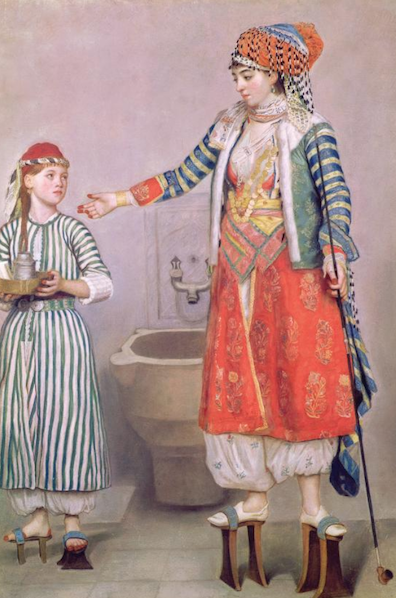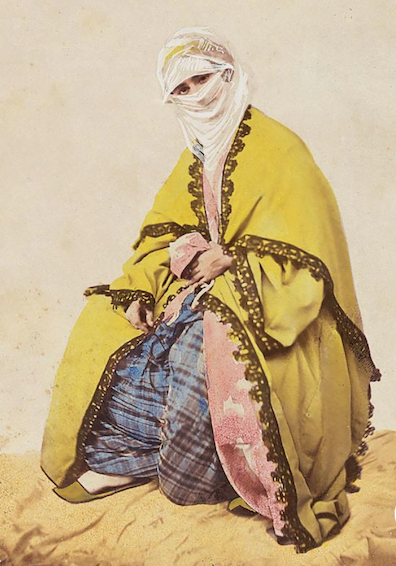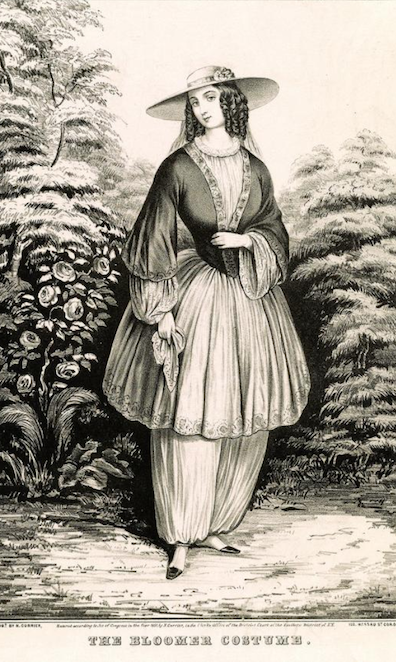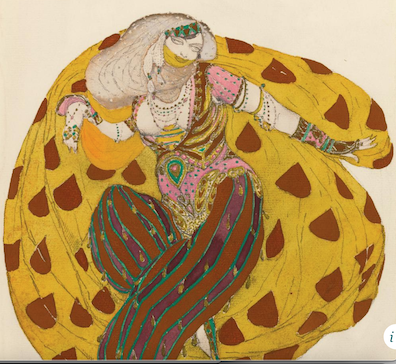In Nausicaa Bloom dimly recalls his dream: "Come in.
All is prepared. I dreamt. What?" Later in the chapter, in a
realistic representation of the experience of remembering
dreams, he recovers some of the details: "Dreamt last night?
Wait. Something confused. She had red slippers on.
Turkish. Wore the breeches. Suppose she does. Would I like
her in pajamas? Damned hard to answer." The sentence
"Wore the breeches" clearly indicates that Bloom's unconscious
mind has generated this costume as an expression of his
awareness that Molly wears the pants in the marriage, and the
question "Would I like her in pajamas?" suggests sexual
uncertainty about his submissive role––is it exciting or
depressing? So when the dream is mentioned again in Oxen,
readers are primed to view the prediction of a "change" as
having something to do with the gender roles in the Bloom
household.
Penelope reveals that Molly too thinks of wearing red
Turkish slippers: "Id have to get a nice pair of red
slippers like those Turks with the fez used to sell or
yellow and a nice semitransparent morning gown that I badly
want." Bloom's dream was most likely prompted by her
telling him of this desire at some time, but it seems remotely
possible that he has an uncanny intuition of it, because the
novel's third protagonist possesses uncanny awareness of
Bloom's dream: Stephen too has vividly dreamed of a Mideastern
figure who invited him to "Come in." By a logic more
straightforward than "contraries" the novel suggests that his
dream predicts Bloom's invitation to come home and meet Molly.
In Circe, the chapter of waking dreams, Stephen finds
his vision becoming reality. He meets Bloom in the "Street of
harlots" as the dream predicted, recognizes other traces of
it, and looks for the "red carpet spread" it promised. The
chapter also turns Bloom into "Haroun al Raschid," the Arab
caliph who led Stephen into his house and promised to
introduce him to a woman. A similar reenactment occurs with
Bloom's dream. Early in Circe he hears a sharp
"Poldy!," dodges an expected blow, and says, "At your
service."
(He looks up. Beside her mirage of
datepalms a handsome woman in Turkish costume stands
before him. Opulent curves fill out her scarlet trousers
and jacket, slashed with gold. A wide yellow cummerbund
girdles her. A white yashmak, violet in the night, covers
her face, leaving free only her large dark eyes and
raven hair.)
BLOOM
Molly!
MOLLY
Welly? Mrs Marion from this
out, my dear man, when you speak to me. (Satirically.)
Has poor little hubby cold feet waiting so long?
In this restaging of Bloom's dream, Molly's independence from
her husband (Boylan boldly addressed her as "
Mrs Marion"
on the envelope confirming the afternoon's adulterous meeting),
and her domineering way of ordering him about ("poor little
hubby"), are thrown into high relief. Her quasi-masculine
costume suggests, as did the
male-attired women in issues of Photo
Bits, that male domination and female submission are
not inscribed in the order of things.
So far, nothing is going by contraries: the dream's elaboration
seems to imply that Molly feels nothing but domineering contempt
for her spouse. Over the course of the next hundred pages or
more, other manly women scorn and demean Bloom, his wife commits
adultery while he watches through a keyhole (dressed as a
servant), and a whoremistress fantastically changes sex to
enslave and brutalize him. But when Bloom frees himself of the
spell of Bello and the Nymph, it seems that the tide of
emasculation may finally be turning. This impression is confimed
at the beginning of
Penelope: "
Yes because he never
did a thing like that before as ask to get his breakfast in
bed with a couple of eggs since the City Arms hotel." This
small change in the breakfast arrangements at 7 Eccles Street
may, one imagines, betoken changes in the marital dynamics as
well.
In putting pants on Molly Joyce no doubt was thinking partly of
his spouse: one night in Galway, Nora and a female friend donned
male attire and went for a stroll, smoking. But by making the
pants Turkish he invoked a broader cultural phenomenon. In an
NEH-published article from which all the images in this note are
taken, "Women's Trousers and Such: The Ottoman influence on
early western feminism" (www.neh.gov, Winter 2020), Sara
Catterall shows how for two centuries women's trousers had been
migrating from Turkey to the West. Catterall writes, "Women’s
trousers have long been a symbol of freedom in the Western
world. But the idea commonly associated with women’s
trousers––that they were inspired by men’s trousers––is not
historically accurate. When women’s rights advocates in Europe
and the United States first promoted trousers for women, many of
them were pointedly
not imitating men. They were
imitating other women, Muslim women. This may sound odd to
anyone who believes that the Muslim world, historically, has
been uniformly opposed to women’s rights. The true story is more
complex."
Trade with the Turks, who had been wearing pants for millennia,
introduced European men to long trousers in the 18th century,
and certain women aspired to join them. In 1716 the admirable
Lady Mary Wortley Montagu, who was married to the British
ambassador, became the first woman to visit the Ottoman Empire
and the first European to write "an eyewitness account of the
daily life, dress, and manners" of Turkish women. Sometimes she
went out in Turkish dress, abandoning the heavy and stiff
English court dress for attire that was both romantic and
practical: "the luxurious and modest but relatively unstructured
forms of traditional Turkish dress felt astonishingly free and
comfortable." In letters to her sister Lady Mary described these
fashions in great detail, including the yashmak that Joyce puts
on Molly: "no Woman, of what rank so ever, is permitted to go in
the streets without two muslins, one that covers her face all
but her Eyes and another that hides the whole dress of her head
and hangs halfe way down her back." The result of veiling, she
felt, was not suppression but freedom, consistent with the
property rights that Turkish women enjoyed: "This perpetual
Masquerade gives them entire Liberty of following their
Inclinations without danger of Discovery."
After Montagu's death in 1762 and the formal publication of her
letters, there was a "craze for Turkish-inspired fashions." Much
later, in 1851, New York newspaperwoman and suffragist Amelia
Bloomer began to popularize a Turkish-style costume that several
other American women had been trying out. It soon became known
as "the Bloomer dress." The fashion died out, but at the end of
the century "bloomers" staged a comeback as clothes for
exercising or visiting the beach. In the years just before the
Great War the Ballets Russes sparked a new wave of Orientalism
with costumes drawing on Asian and Mideastern models. Designer
Paul Poiret, inspired by these sumptuous costumes, began to
explore new styles of women's dress, and many others followed
his lead.
Though frequently misunderstood and/or derided, the
intention behind these successive waves of imitation was never
to confine women to an imagined harem, but on the contrary to
liberate them from European strictures of dress and custom.
Joyce seems well aware of this. His "handsome woman in
Turkish costume" is not a plaything of pashas but an
independent and powerful sexual actor. An interesting feminist
logic inheres in his decision to point Bloom toward sexual
independence by putting Molly in trousers. Can either sex be
free, the novel seems to ask, if the other is enslaved?
Molly's freedom to commit adultery on June 16––putting on the
pants, as it were––challenges Bloom to act with a similar
sense of self-possession. The fantasy of a Turkish costume is
of a piece with other sartorial images of sexually active
women in Ulysses, from the outrageously suggestive
unisex hunting attire of horsey women like Mrs.
Mervyn Talboys to the quieter appeal of the tam that
Bloom gives his daughter for her birthday.



